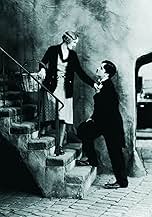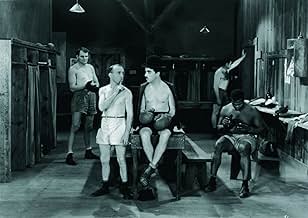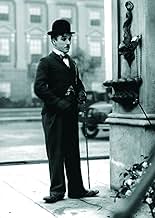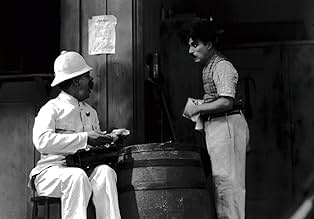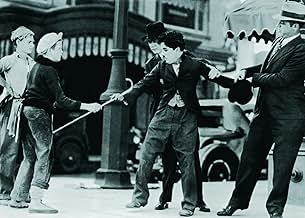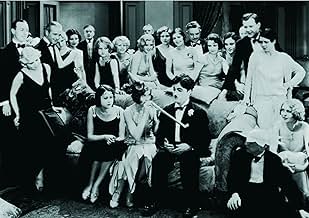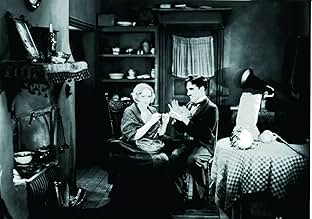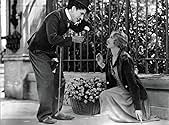Charlot vagabond vient en aide à une jeune fleuriste aveugle et se fait passer pour un homme riche. A force de travail il réunit assez d'argent pour que la jeune fille recouvre la vue.Charlot vagabond vient en aide à une jeune fleuriste aveugle et se fait passer pour un homme riche. A force de travail il réunit assez d'argent pour que la jeune fille recouvre la vue.Charlot vagabond vient en aide à une jeune fleuriste aveugle et se fait passer pour un homme riche. A force de travail il réunit assez d'argent pour que la jeune fille recouvre la vue.
- Réalisation
- Scénario
- Casting principal
- Récompenses
- 6 victoires au total
Charles Chaplin
- A Tramp
- (as Charlie Chaplin)
Al Ernest Garcia
- The Millionaire's Butler
- (as Allan Garcia)
Johnny Aber
- Newsboy
- (non crédité)
Jack Alexander
- Boxing Match Spectator
- (non crédité)
T.S. Alexander
- Doctor
- (non crédité)
Victor Alexander
- Superstitious Boxer
- (non crédité)
Albert Austin
- Street Sweeper
- (non crédité)
- …
Harry Ayers
- Cop
- (non crédité)
Eddie Baker
- Boxing Fight Referee
- (non crédité)
Henry Bergman
- Mayor
- (non crédité)
- …
Edward Biby
- Nightclub Patron
- (non crédité)
Betty Blair
- Woman at Center of Table in Restaurant
- (non crédité)
Buster Brodie
- Bald Party Guest
- (non crédité)
Jeanne Carpenter
- Diner in Restaurant
- (non crédité)
Résumé
Reviewers say 'City Lights' is celebrated for its blend of comedy and pathos, showcasing Charlie Chaplin's iconic Tramp character in a poignant love story with a blind flower girl. The film is praised for its masterful physical comedy, expressive acting, and memorable scenes, particularly the boxing match and the emotional finale. Chaplin's direction, composition of the score, and the film's historical significance are frequently highlighted. However, some reviewers note that the silent format and slow pacing may challenge modern audiences. The themes of love, selflessness, and social commentary resonate deeply, making 'City Lights' a timeless classic.
Avis à la une
I always thought this was one of Charlie Chaplin's nicest, most under-appreciated silent movie gems. Then I discovered it really wasn't underrated; it's rated very high on most critics' lists. It may be that I usually hear about some of his other movies than I do this one.
Part of the reason I think so highly of this is simply that I'm a sentimentalist and story in this film is a very touching one. It's a romance between Charlie's tramp character (no name) and a blind girl, who also had no name in this film. Virginia Cherill, who played the blind woman and had a wholesome, pretty face which I found very attractive.
I'm not always a huge fan of pantomime except for some great comedians of the era like Chaplin, Harold Lloyd and Buster Keaton, but Chaplin was so good at it and this is one of the last of dying breed as "talkies" were out in full force by 1931. Chaplin was at his best in silent movies, anyway, and his comedy routines are legendary. He gave me a lot of laughs in this film, as always, and I particularly laughed (I love slapstick) at the boxing scene. Kudos, too, to Harry Myers as the "eccentric millionaire."
There's a lot of drama as well as humor in this 86-minute gem as the Tramp tries to aid a blind girl, raising money so she can get an operation to restore her sight.
Comedy, romance, drama (with suffering) all combine to make this an extraordinary piece of entertainment. It's hard to believe this movie was not up for one, single Academy Award.
Part of the reason I think so highly of this is simply that I'm a sentimentalist and story in this film is a very touching one. It's a romance between Charlie's tramp character (no name) and a blind girl, who also had no name in this film. Virginia Cherill, who played the blind woman and had a wholesome, pretty face which I found very attractive.
I'm not always a huge fan of pantomime except for some great comedians of the era like Chaplin, Harold Lloyd and Buster Keaton, but Chaplin was so good at it and this is one of the last of dying breed as "talkies" were out in full force by 1931. Chaplin was at his best in silent movies, anyway, and his comedy routines are legendary. He gave me a lot of laughs in this film, as always, and I particularly laughed (I love slapstick) at the boxing scene. Kudos, too, to Harry Myers as the "eccentric millionaire."
There's a lot of drama as well as humor in this 86-minute gem as the Tramp tries to aid a blind girl, raising money so she can get an operation to restore her sight.
Comedy, romance, drama (with suffering) all combine to make this an extraordinary piece of entertainment. It's hard to believe this movie was not up for one, single Academy Award.
Film has become a medium that is strongly influenced by nostalgia. Old films have become journeys to the past; ways to visit times and people that no longer are. Since film is an art that is based on the innovation of previous works, it has an element of nostalgia in its foundation. We look on the old to find what elements should make up the new. In City Lights, and other silent works of film, a passion emerges that is uniquely honest and sincere. While watching the film, I was impressed that Chaplin really did love the story, the sets, the crew; the whole project. While this may not have been the complete reality, it felt that way, and thus made the film more enjoyable. In silent films the audience is forced to be completely reliable on the visual elements of the film; there are no elaborate sound effects or dialogue to provoke an emotional response.
Since film is at its very core a visual medium, I find silent films to be the basic form of the medium. I don't use the word basic here in a demeaning sense, but I compare the beauty of silent films to the beauty of early European art, before the concept of perspective was developed in the Renaissance. Many books and tomes featured people as tall as the castles they stood in; these works of art were not technologically advanced, but they were, and are, beautiful. The same example is found when comparing early darreographs of wild animals to contemporary photographs found in National Geographic. There is a warmth found in City Lights, and other Chaplin films (The Kid, Modern Times) that would be lost in the sea of cinematic technology that floods films today. Maybe it's just that with simplicity comes honesty, and honesty is perhaps the most powerful emotion that can cross through the screen and be felt by the viewer.
Since film is at its very core a visual medium, I find silent films to be the basic form of the medium. I don't use the word basic here in a demeaning sense, but I compare the beauty of silent films to the beauty of early European art, before the concept of perspective was developed in the Renaissance. Many books and tomes featured people as tall as the castles they stood in; these works of art were not technologically advanced, but they were, and are, beautiful. The same example is found when comparing early darreographs of wild animals to contemporary photographs found in National Geographic. There is a warmth found in City Lights, and other Chaplin films (The Kid, Modern Times) that would be lost in the sea of cinematic technology that floods films today. Maybe it's just that with simplicity comes honesty, and honesty is perhaps the most powerful emotion that can cross through the screen and be felt by the viewer.
This is my favorite Chaplin film, but I don't want that to diminish his other work, either. MODERN TIMES was an outstanding work of social satire, THE GOLD RUSH was great slapstick, and even the largely-neglected MONSIEUR VERDOUX strikes a certain unforgettable tone. Chaplin didn't make a bad movie, and I'm not even sure that CL is his best, exactly. But it IS my favorite, if only for the ending.
That ending has been the subject of much comment here. I think it's a masterpiece in a single scene. Chaplin's little tramp has never seemed less like a character and more like a living, breathing human being. It's a monument to understated sentimentality.
To me, the rest of the film exists largely to set the context for that one magnificent piece of celluloid. Yes, the boxing scene is great, and the scene where he rescues the millionaire is also wonderful, but it's that ending that makes us all love this movie.
That ending has been the subject of much comment here. I think it's a masterpiece in a single scene. Chaplin's little tramp has never seemed less like a character and more like a living, breathing human being. It's a monument to understated sentimentality.
To me, the rest of the film exists largely to set the context for that one magnificent piece of celluloid. Yes, the boxing scene is great, and the scene where he rescues the millionaire is also wonderful, but it's that ending that makes us all love this movie.
City Lights (1931)
**** (out of 4)
Charlie Chaplin returns as The Tramp and this time he falls in love with a blind girl (Virginia Cherrill) and sets out to help her. The Tramp eventually meets a suicidal drunk (Harry Myers) and their friendship leads to what might eventually help the girl he loves.
Chaplin made great films before and after CITY LIGHTS but for my money this here is his greatest film as well as one of the greatest films ever made. Not only is it one of the funniest movies ever made but I'd also argue that it's one of the greatest love stories, if not the greatest. It really says a lot when a movie can conqueror two genres at one time but CITY LIGHTS is simply one of the greatest movies ever made.
I think it says a lot that you get one classic scene after another and there's really not a weak spot to be found here. Being 1931 it took some real guts for Chaplin to deliver a silent film and I think he knew that he had to deliver something special because people had moved onto sound. He certainly delivered something special as this here was easily the funniest film he had made up to this point. The opening sequence with the introduction of The Tramp was priceless and we got one hilarious scene after another from that point.
The scenes with the drunk are downright hilarious as is another scene where The Tramp is trying to eat but without much success. The cigar sequence is a masterpiece as is the by the water. In fact, the story between The Tramp and the drunk would have made a terrific movie on its own. Just like the stuff with The Tramp and the blind girl would have made a perfect film. What's so special is that you get both stories wrapped up in one and it really delivers.
Chaplin played The Tramp countless times but he was never better than he is here. Just check out the timing in countless scenes including the boxing match and you can't help but be impressed with the actor. Myers also deserves a lot of credit as the drunk as his timing has to match that of Chaplin throughout and the two men do a wonderful job together. Then you've got Cherrill who wasn't a professional actor but the director makes her shine throughout.
CITY LIGHTS contains one great scene after another and all of the laughs lead up to one of the most powerful endings in film history. There's really not enough great things that can be said about this film as it continues to get better with each passing year.
**** (out of 4)
Charlie Chaplin returns as The Tramp and this time he falls in love with a blind girl (Virginia Cherrill) and sets out to help her. The Tramp eventually meets a suicidal drunk (Harry Myers) and their friendship leads to what might eventually help the girl he loves.
Chaplin made great films before and after CITY LIGHTS but for my money this here is his greatest film as well as one of the greatest films ever made. Not only is it one of the funniest movies ever made but I'd also argue that it's one of the greatest love stories, if not the greatest. It really says a lot when a movie can conqueror two genres at one time but CITY LIGHTS is simply one of the greatest movies ever made.
I think it says a lot that you get one classic scene after another and there's really not a weak spot to be found here. Being 1931 it took some real guts for Chaplin to deliver a silent film and I think he knew that he had to deliver something special because people had moved onto sound. He certainly delivered something special as this here was easily the funniest film he had made up to this point. The opening sequence with the introduction of The Tramp was priceless and we got one hilarious scene after another from that point.
The scenes with the drunk are downright hilarious as is another scene where The Tramp is trying to eat but without much success. The cigar sequence is a masterpiece as is the by the water. In fact, the story between The Tramp and the drunk would have made a terrific movie on its own. Just like the stuff with The Tramp and the blind girl would have made a perfect film. What's so special is that you get both stories wrapped up in one and it really delivers.
Chaplin played The Tramp countless times but he was never better than he is here. Just check out the timing in countless scenes including the boxing match and you can't help but be impressed with the actor. Myers also deserves a lot of credit as the drunk as his timing has to match that of Chaplin throughout and the two men do a wonderful job together. Then you've got Cherrill who wasn't a professional actor but the director makes her shine throughout.
CITY LIGHTS contains one great scene after another and all of the laughs lead up to one of the most powerful endings in film history. There's really not enough great things that can be said about this film as it continues to get better with each passing year.
Charlie Chaplin's "City Lights" contains a blend of humor and humanity that make it memorable for everyone who watches it. Although made very much in the old-fashioned silent film tradition, much of it is timeless, too.
After a few minutes of slapstick at the beginning, Charlie's "little tramp" character makes two acquaintances. He meets a blind girl selling flowers, who mistakes him for a rich man, and the two become very fond of each other. Then he meets a real millionaire, who is drunk, depressed, and about to commit suicide. In a comic scene, the tramp persuades the millionaire not to go through with it, making himself a devoted friend.
The tramp soon learns that there is an operation that could give the girl her sight, and tries to think of some way he could help. His scenes with the girl and her grandmother are moving, while his determination to help lead him into some comic escapades - his attempt to win money in a boxing match being particularly funny, and one of Chaplin's best comic pieces. Meanwhile, when his millionaire friend is drunk, he dotes on the tramp, but when sober he forgets who the tramp is, leading to more amusing scenes and occasional trouble for Charlie.
All of the comedy leads up to a finale that is one of the best-remembered scenes in any film. "City Lights" shows the power of the camera in the hands of a master, who without words can move his audience or make them laugh. Anyone who appreciates good cinema should see it at least once.
After a few minutes of slapstick at the beginning, Charlie's "little tramp" character makes two acquaintances. He meets a blind girl selling flowers, who mistakes him for a rich man, and the two become very fond of each other. Then he meets a real millionaire, who is drunk, depressed, and about to commit suicide. In a comic scene, the tramp persuades the millionaire not to go through with it, making himself a devoted friend.
The tramp soon learns that there is an operation that could give the girl her sight, and tries to think of some way he could help. His scenes with the girl and her grandmother are moving, while his determination to help lead him into some comic escapades - his attempt to win money in a boxing match being particularly funny, and one of Chaplin's best comic pieces. Meanwhile, when his millionaire friend is drunk, he dotes on the tramp, but when sober he forgets who the tramp is, leading to more amusing scenes and occasional trouble for Charlie.
All of the comedy leads up to a finale that is one of the best-remembered scenes in any film. "City Lights" shows the power of the camera in the hands of a master, who without words can move his audience or make them laugh. Anyone who appreciates good cinema should see it at least once.
Le saviez-vous
- AnecdotesChaplin re-shot the scene in which the Little Tramp buys a flower from the blind flower-girl 342 times, as he could not find a satisfactory way of showing that she thought the mute tramp was wealthy.
- Gaffes(at around 50 mins) When the man swallows part of the Tramp's soap and starts spraying bubbles, the tube used to spray the bubbles is clearly visible behind him.
- Citations
The Tramp: You can see now?
A Blind Girl: Yes, I can see now.
- Versions alternativesAbout seven minutes of footage of Georgia Hale playing the flower girl exists and is included in the 2003 DVD release. The footage was shot during a brief period when the actress originally cast to play the character had been fired and replaced with Hale, but Charles Chaplin was forced to resume filming with the original actress due to the amount of film already shot.
- ConnexionsEdited into Histoire(s) du cinéma: Fatale beauté (1994)
Meilleurs choix
Connectez-vous pour évaluer et suivre la liste de favoris afin de recevoir des recommandations personnalisées
Détails
- Date de sortie
- Pays d’origine
- Site officiel
- Langues
- Aussi connu sous le nom de
- Luces de la ciudad
- Lieux de tournage
- Société de production
- Voir plus de crédits d'entreprise sur IMDbPro
Box-office
- Budget
- 1 500 000 $US (estimé)
- Montant brut aux États-Unis et au Canada
- 19 181 $US
- Week-end de sortie aux États-Unis et au Canada
- 9 102 $US
- 8 juil. 2007
- Montant brut mondial
- 55 154 $US
- Durée
- 1h 27min(87 min)
- Couleur
- Mixage
Contribuer à cette page
Suggérer une modification ou ajouter du contenu manquant

